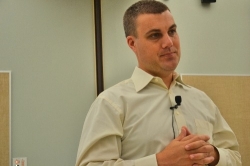 This July, Greg Williams celebrated 17 years of sobriety. If you had told him 17 years ago that he was not only going to stop using drugs and alcohol but become a leading advocate on addiction treatment and recovery, he would’ve thought you crazy.
This July, Greg Williams celebrated 17 years of sobriety. If you had told him 17 years ago that he was not only going to stop using drugs and alcohol but become a leading advocate on addiction treatment and recovery, he would’ve thought you crazy.
“I didn’t wake up one morning and say, ‘I’ve had a long career at this. Time to get sober.’ That wasn’t necessarily my journey,” said Williams, who served as the keynote speaker for day two of the 2018 Susan Li Conference hosted by Hope Academy and Fairbanks.
Williams started early with alcohol, around age 12 or 13. His family has a history of addiction. Williams also later acknowledged past trauma he had never addressed. By 16 he was using opiates and Benzodiazepines. He didn’t think he had a problem. After all these were prescriptions, not something he was buying on the street.
Williams was in a near-fatal car accident in July 2001. From the hospital he wound up in a psychiatric unit, then, being 17 at the time, an adolescent chemical dependency program. He an addict? Couldn’t be. He lived in Connecticut. Going to New York and seeing homeless people with needles in their arms, those were the addicts.
“That was the first time in my life I walked into a program and there were 30 other people my age who had the same story as me,” Williams said of that adolescent program.
“I’m very grateful to be alive. I really believe that if I was still using, I wouldn’t be alive today, especially with how opioids have evolved with things like fentanyl.”
After treatment Williams studied media production at the University of Colorado. A documentary filmmaking course focused his interest on telling the stories of others who’ve found recovery. Before it started being called an opioid crisis, people were still dying from addiction but few families would acknowledge the circumstances because of the stigma.
“Everyone knew how they died, we just didn’t have the courage to put it in the obituary,” Williams said. “That’s changing now, and it’s a big cultural moment just like it was with HIV and AIDS when families started telling the truth.”
Williams has been to an unfortunate number of funerals stemming from addiction. The shaming and rumors he heard at them made him angry. He remembers being told in treatment that there’s no luck in recovery. Williams knows now that’s a lie.
“The reason I’m standing here is luck and circumstance,” he said. “My insurance card worked and I walked in the right door at the right time. The people whose funerals I attended didn’t get as lucky as I did.”
It made Williams feel like the story of recovery wasn’t being properly told, or told enough.
“People just didn’t believe that people could get well,” he said. “We perceive addiction to be whatever’s in the daily police blotter. That’s how we’ve always responded to it. Not enough people know about the 23 million Americans in recovery.”
Williams started meeting and learning about trailblazers in the recovery community. Folks like William White, who published in 1998 Slaying the Dragon, The History of Addiction Treatment and Recovery in America and challenged those in recovery to come out of the shadows. And Marty Mann, one of the first female members of Alcoholics Anonymous and who encouraged the medical community to treat alcoholism as a disease rather than a moral failing.
“It lit a fire in me to want to tell their stories, and bring them into different mediums,” Williams said.
In 2013 he released the documentary “The Anonymous People,” which featured residents from across the country who are in recovery. Because it was released independently, each screening had to be crowdsourced, meaning enough people had to buy tickets in advance before a theater would show it instead of a studio-backed, nationally-distributed film. Indianapolis was one of the first cities to host a screening.
Making “The Anonymous People” was a cathartic experience for Williams. He traveled the country conducting interviews and filming rallies during the 2000s. Recovery was starting to come out of hiding.
“It was really transformative when you think about the shame and marginalization of addiction that happens so often,” said Williams, who later co-founded the non-profit advocacy group Facing Addiction and served as campaign director and an executive producer of the Unite to Face Addiction Rally on Washington, D.C.’s National Mall. His most recent film is 2016’s “Generation Found,” about people uniting to take on youth addiction in their community.
Indeed, Williams didn’t disclose his own sobriety for the first six years. After testifying before the Connecticut legislature about addiction and recovery, a Hartford Courant reporter asked for an interview. Williams agreed, but only if his last name wasn’t used. After it was published, he started reconsidering his anonymity. Still young at the time, Williams worried that revealing his past would close doors to future opportunities. A mentor asked, if recovery’s that important to you and someone closed you off because of it, is that a doorway you’d ever want to walk through anyway?
“I’ve had nothing but doors open as a result of disclosing my recovery status,” Williams said. “What I try to do today is help empower others. That’s the work ahead of us. If we have frustrations with the system, the core problem is we haven’t empowered those who can speak for those who can’t.”